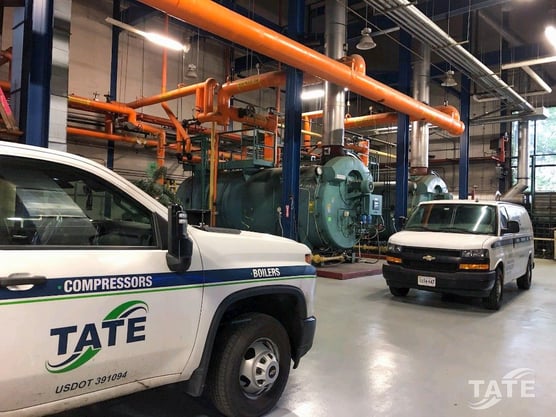
As the heating season comes to a close and cooling season begins, you may be tempted to shut your boiler down and not think about it again until the fall. As tempting as this may be, doing maintenance on your boiler in the spring can save you both time and money, not to mention the headache of losing a boiler when it’s frigid outside and you need it most. Having a preventative maintenance program in place for your boiler will make your spring boiler maintenance quick and efficient.
Clean Up
A little bit of cleaning goes a long way when it comes to preventative maintenance. Cleaning components has two major benefits. One benefit is that clean components work better. Components that are not covered in dirt, grime, and buildup allow the system to operate more efficiently, which lowers the energy bill associated with the equipment and keeps the system from having to work as hard.
Related: Boiler Cleaning
The second benefit is that small problems can’t hide behind a layer of dirt. Small cracks, for example, are much easier to find once a part has been cleaned. Document any irregularities or issues that you find during your spring boiler maintenance and replace parts as needed. This information is great for building out future preventative maintenance plans and determining what spare parts should be kept on-site.
Related: Boiler Maintenance Checklist
Fix Obvious Problems
Are there any potential problems forming within your boiler system that you’re already aware of? If the answer is yes, you should consider taking care of them quickly before other needs arise at your facility and your workload gets bigger. Fixing obvious problems quickly helps prevent them from growing into much bigger problems down the road. Some obvious things to look for include:
- Leaking tubes or cracks
- Deteriorated or cracked refractory
- Dirty filters
- Leaks in exhaust ductwork
- Clogged flue stacks
- Debris in strainers on valves
- Debris in the burner area
- Oil leaks
Get to Know Your Equipment
Knowing your equipment is important because it allows you to spot potential issues before anyone else will. If you check the water and oil levels, temperatures, and pressures of your boiler daily, you’ll start to get a feel for how your boiler operates. All of these different measurements are like the vital signs of your boiler. If these values start to change, you’ll notice much sooner. Even if the values are still within the allowable range, noticing problems early allows you to catch and address them that much faster.
Let It Cool
Will your boiler be completely shut down until the next heating season? If so, be sure to check with the boiler manufacturer’s recommendations on cooldown times. ASME suggests turning the boiler off and allowing it to cool to below 120 degrees F prior to draining. Once the boiler has cooled and been drained, get right to work on cleaning and maintenance. Much of the buildup inside a boiler is easier to remove while it is still wet. Once the buildup dries and hardens, it’ll take a lot more elbow grease to get it clean.
Related: Must-Have Boiler Tools
Spring boiler maintenance is crucial to keeping equipment running reliably. With a plan in place ahead of time, it is easier to make sure that all of the proper maintenance is performed. Use the experts at Tate to ensure that your boiler system is cleaned, inspected, and ready to heat next winter.
